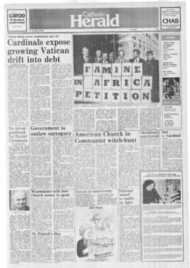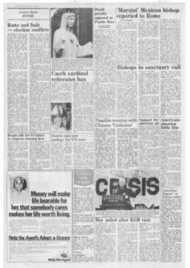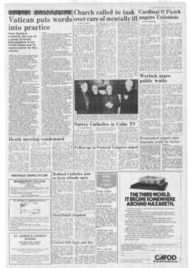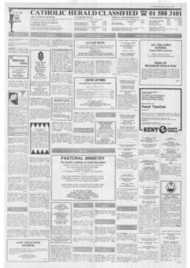Page 6, 15th March 1985
Page 6

Report an error
Noticed an error on this page?If you've noticed an error in this article please click here to report it.
Tags
Share
Related articles
Polaris 'revenge Weapon' Says Mgr. Bruce Kent
Is Conscription Necessary?
Flowers In Farm Street
Next Bold Step
The Christian Call To Peace
Into a threatened Scottish paradise
Between McAlpine and Polaris, by G G Giarchi, (RKP, £12.95) "MILITARY invasion, industrial intrusion, bureaucratic take-over": such effects of modernity would threaten any rural society. Yet, the advent of the US Polaris base at Holy Loch, the influx of hundreds of North Sea oil construction workers, and incorporation into the vast administrative unit of Strathclyde, changed for ever the appearance and lifestyle of the Cowal Peninsula in southern Argyllshire.
George Giarchi, now lecturing at Plymouth Polytechnic, grew up in Dunoon. In 1974 he returned there to begin this carefully-researched study into the impact of these changes upon this beautiful part of Scotland. Although hardly a book for those unfamiliar with the language and methodology of the social scientist, Giarchi's investigation adopts a novel and, in my view, interesting analytical approach. Conscious of Gerard Manley Hopkins' insight into the dialogue between external reality and interior perception, the author examines what lie terms "the social inscape", setting oust to understand the impact of such dramatic changes upon the local inhabitants and their environment.
Initial economic gains seem to have been outweighed by the many social ills resulting from the military and commercial invasions: illegitimacy, drug. taking, street riots between local youths and American servicemen, disparity in the wages earned by the construction workers in relation to the Dunoon workforce. Moreover, a sense of impotency was felt as absorption into the political orbit of Glasgow heralded the redundancy of the Dunoon Town Council.
On the eve of the book going to press a local resident wrote thus to Giarchi: "The democratic structure of this nation is a hoax. The UK is ruled by the USA . . . no Parliament can control the situation." The 2vidence gathered in the book makes it hard to refute such a depressing conclusion — this should be recommended as reading for those in Whitehall.
Stewart Foster
blog comments powered by Disqus











